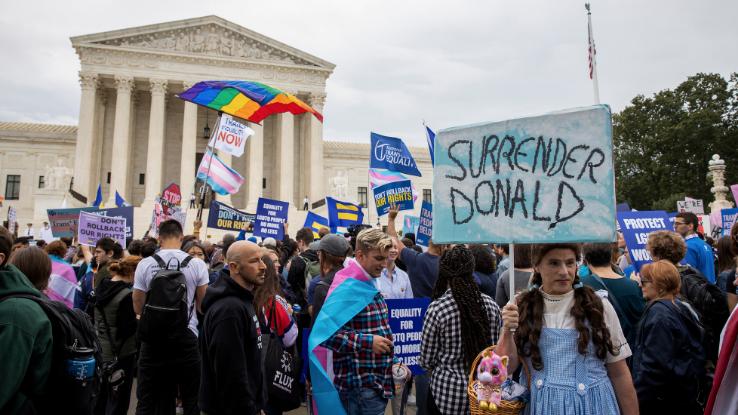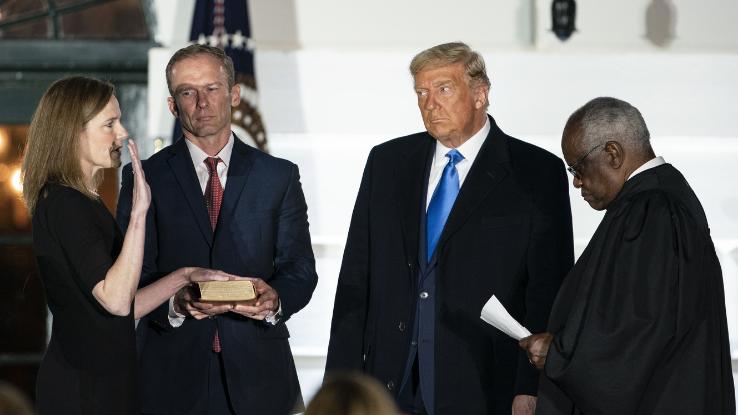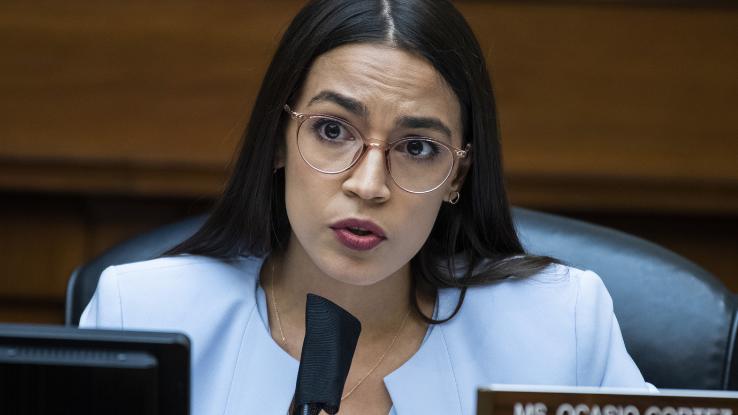The Supreme Court Reviewing and Ruling on Acts of the Other Branches of Government Is Called

When Justice Ruth Bader Ginsburg passed abroad on September eighteen, 2020, many Americans didn't have the proper fourth dimension to grieve — instead, they panicked near what her passing meant for the future of the land. Property the balance of an entire democracy is too great a burden for anyone'southward shoulders, and Justice Ginsburg had been conveying that weight for a long, long fourth dimension. Instead of holding infinite for her passing, Republican politicians wasted no time in queuing upward a nominee for the empty Supreme Court seat, eventually landing on Amy Coney Barrett — a longtime Notre Dame Law Schoolhouse professor who served fewer than iii years on the 7th Circuit before her nomination to the highest court in the American judicial arrangement.
In 2016, then-Senate Majority Leader Mitch McConnell infamously vowed to block President Obama's outgoing Supreme Courtroom nomination of Merrick Garland on the grounds that the American people should have a "vocalisation" and that to blitz a nomination (and confirmation) would be to overly politicize the issue. In 2020, however, McConnell didn't hold to those principles he outlined four years earlier, leading to Barrett'south confirmation hearings and equally rushed swearing in ceremony, which took place nearly a calendar week before Ballot 24-hour interval on October 26, 2020.
This move led many to criticize McConnell, including New York Representative Alexandria Ocasio-Cortez (@AOC), who merely tweeted, "Expand the court." Additionally, Massachusetts Senator Ed Markey (@EdMarkey), who is Ocasio-Cortez's Green New Deal co-author, tweeted, "Mitch McConnell set up the precedent. No Supreme Court vacancies filled in an election year. If he violates it, when Democrats command the Senate in the side by side Congress, we must abolish the filibuster and expand the Supreme Courtroom."
The Number of Supreme Court Seats Has Been Adjusted Earlier — Here's How It'due south Done
This call for a SCOTUS expansion has led many to wonder: Is such a move even possible? The short answer: yeah. Congress could easily alter the number of seats on the Supreme Court bench. According to the Supreme Courtroom's website, "The Constitution places the power to determine the number of Justices in the hands of Congress" — just another example of those supposed checks and balances that guide a ramble government. In fact, the number of Justices has shifted several times throughout the Court's history. In 1789, the first Judiciary Act set the number of Justices at half dozen; during the Ceremonious War, the number of seats went up to nine and so briefly ten; and, once President Andrew Johnson took function, Congress passed the Judicial Circuits Human activity in 1866, cutting the number of Justices to seven so that Johnson couldn't stack the court in favor of Southern states.

Since 1869, however, the Supreme Court has been equanimous of nine Justices. In semi-recent history, there's been 1 notable endeavour to expand the Court — ane that volition live in infamy, so to speak. Back in 1937, President Franklin Delano Roosevelt aimed to expand the Court, which kept shooting downwardly some of his New Deal legislation. More specifically, FDR felt that many of the older Justices were out of touch with the times, then much and then that they were colloquially dubbed the "nine quondam men."
FDR'southward proposal? Add one Justice to the Supreme Court for every 70-year-old Justice residing on the bench. That would've resulted in xv Supreme Courtroom Justices, only even the Democrat-controlled Congress — and FDR's own Vice President — were against the idea. Since FDR'south infamous defeat, no attempt to expand or reduce the Supreme Court has gathered much steam — until now.
How Probable Is It That Democrats Will Expand the Supreme Court in 2021?
Interestingly enough, Politico points out that President Biden has been outspoken about not expanding the court. In 2019, President Biden even went every bit far as saying "nosotros'll live to rue that day [we expand the Courtroom]," arguing that an expansion would pb to constant changes — more expansions, more than reductions. In brusk, it would shake the American people'due south organized religion in the legitimacy of the Supreme Courtroom (and potentially the Democratic party). Of form, that'due south just one scenario — and one that hasn't happened in the past. Merely, in the by, Vice President Kamala Harris has shown some back up for the idea, maxim she'd exist "open" to it. However, both Vice President Harris and President Biden have also dodged questions surrounding courtroom-packing and Supreme Court expansion.

On the other paw, more than outspoken proponents have tried to gather momentum for the thought. Representative Ocasio-Cortez expanded upon her initial "Expand the Courtroom" tweet, calling out Republicans' hypocrisy toward appointing new Justices during presidential election years. "Republicans practice this considering they don't believe Dems take the stones to play hardball like they practice. And for a long time they've been right," Ocasio-Cortez tweeted. "But practice not let them not bad the public into thinking their bulldozing is normal but a response isn't. At that place is a legal procedure for expansion."
In the face of a vi–iii Conservative majority, folks like Representative Ocasio-Cortez argue that the Supreme Court is out of residuum — and, more than that, information technology isn't quite cogitating of the American people's concerns and values. Then much lies in the hands of the court: the fate of the Affordable Intendance Deed, Roe v. Wade and marriage equality, just to name a few. Now, we'll just take to see if this imbalance — and Barrett'southward speedy engagement — are enough to convince President Biden and members of Congress to seriously consider a Supreme Court expansion.
Source: https://www.ask.com/culture/ask-answers-expand-supreme-court?utm_content=params%3Ao%3D740004%26ad%3DdirN%26qo%3DserpIndex
Publicar un comentario for "The Supreme Court Reviewing and Ruling on Acts of the Other Branches of Government Is Called"